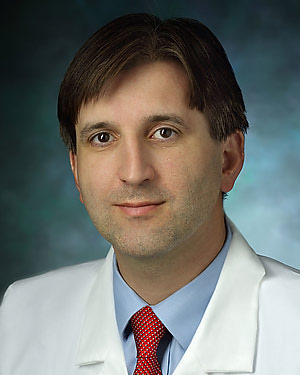Research Lab Results
-
Alzheimer's Disease Research Center
The goal of the Johns Hopkins Alzheimer's Disease Research Center (ADRC) is to accelerate the discovery of new treatments that are directed at the basic mechanisms of disease, and to hasten the time when effective treatments for AD and related disorders become a reality. We have a strong commitment to basic research regarding the underlying mechanisms of Alzheimer's Disease and related disorders, and how this may translate into effective treatment. We perform clinical research seeking to identify medications to delay or treat the symptoms of dementia. We also provided many educational programs for family members and professionals. -
Brain Health Program
The Brain Health Program is a multidisciplinary team of faculty from the departments of neurology, psychiatry, epidemiology, and radiology lead by Leah Rubin and Jennifer Coughlin. In the hope of revealing new directions for therapies, the group studies molecular biomarkers identified from tissue and brain imaging that are associated with memory problems related to HIV infection, aging, dementia, mental illness and traumatic brain injury. The team seeks to advance policies and practices to optimize brain health in vulnerable populations while destigmatizing these brain disorders. Current and future projects include research on: the roles of the stress response, glucocorticoids, and inflammation in conditions that affect memory and the related factors that make people protected or or vulnerable to memory decline; new mobile apps that use iPads to improve our detection of memory deficits; clinical trials looking at short-term effects of low dose hydrocortisone and randomized to 28 days of treatment; imaging brain injury and repair in NFL players to guide players and the game; and the role of inflammation in memory deterioration in healthy aging, patients with HIV, and other neurodegenerative conditions. -
Sevil Yasar Lab
Research areas in the Sevil Yasar Lab include dementia, cognitive decline, hydrocephalus and pharmacoepidemiology. Recently, we studied the ability of fatty acid amide hydrolase (FAAH) inhibitors to block the rewarding effects of nicotine in squirrel monkeys.
-
JHU NIMH Research Center
The Johns Hopkins NIMH Center is comprised of an interdisciplinary research team who has pooled their talents to study the nature of HIV-associated neurocognitive disorders (HAND). Their aim is to translate discoveries of the pathophysiological mechanisms into novel therapeutics for HAND.Our objectives are to integrate aspects of ongoing research in HAND and SIV encephalitis; to develop high-throughput and screening assays for identifying novel therapeutic compounds; to use proteomics and lipidomics approaches to indentifying surrogate markers of disease activity; to disseminate information and education about HAND through existing and new educational systems, including the JHU AIDS Education Training Center and the JHU Center for Global Clinical Education and to facilitate the entry of new investigators into neuro-AIDS research, and to catalyze new areas of research, particularly where relevant for drug discovery or the development of validated surrogate markers. -
Center on Aging and Health
The Center on Aging and Health pursues creative approaches to solve the important health and health care problems for an aging population. Research in our center involves population-based and clinical studies of the causes, correlates, and consequences of aging-related conditions, including frailty, disability, and social isolation. We house four distinct research working groups: the Frailty and Multisystem Dysregulation Working Group; the Family and Social Resources Working Group; the Cognitive and Sensory Functions Working Group; and the Biostatistics, Design and Analysis Working Group. We provide key infrastructure, such as the statistical data core, that supports clinical- and population-based research and education with expertise in research with older adults. -
Brain Health Program
The Johns Hopkins Brain Health Program is a multi-specialty team of experts from the Johns Hopkins School of Medicine, Whiting School of Engineering, and the Bloomberg School of Public Health. -
Esther Oh Lab
The Esther Oh Lab is interested in developing biological markers for pre-clinical stages of Alzheimer's disease (AD). Our current research involves using transgenic models of AD to develop peripheral injections of monoclonal antibodies against amyloid-beta as a tool to detect a level of amyloid-beta that would be correlative to the amyloid-beta level in the brain.
-
Kashani Lab
Dr. Amir Kashani and his team are developing novel diagnostic and therapeutic methods to diagnose and treat retinal diseases using advanced imaging methods. These methods can detect the earliest changes in retinal capillaries before they are noticeable to the patient or doctor. -
Tsapkini Language Neuromodulation Lab
We are exploring whether anodal tDCS when administered in combination with spelling, naming, or working memory therapy can improve language performance of PPA and MCI participants at least in the short term more than behavioral therapy alone. We are also investigating whether and how tDCS alters the neuropeptide signature in participants with PPA and MCI. We use proton magnetic resonance spectroscopy (1H-MRS) to monitor neuropeptide concentrations at the areas of stimulation. We hypothesize that tDCS will stabilize the decline of specific neuropeptides, but only in those areas of the brain where tDCS effectively results in more efficient gains in language compared to language therapy alone (with sham tDCS). Study results may help optimize future intervention in individuals with PPA and MCI by providing treatment alternatives in a neurodegenerative condition with no proven effective treatment. A better understanding of the therapeutic and neuromodulatory effects of tDCS in PPA and MCI will offer insight into ways of impeding neurodegeneration that may improve quality of life for individuals with PPA and MCI and may provide insights into the mechanisms of this treatment for augmenting therapy for stroke as well. -
S.C.O.R.E. Lab
The mission of the Stroke Cognitive Outcomes and Recovery (S.C.O.R.E.) Lab is to enhance knowledge of brain mechanisms that allow people recover language, empathy, and other cognitive and communicative functions after stroke, and to improve ways to facilitate recovery of these functions after stroke. We also seek to improve the understanding of neurobiology of primary progressive aphasia., and how to enhance communication in people with this group of clinical syndromes.






